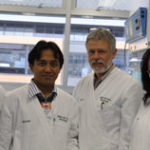

Replacing anthrax culture
March 20, 2014

Three Indonesian veterinarians from laboratories in Bali, South Sulawesi and Timor, visited the NSW Department of Primary Industries’ Elizabeth Macarthur Agricultural Institute (EMAI) recently to learn about biosecure anthrax diagnostic methods.
This training was funded by the Crawford Fund with strong support from the NSW Department of Primary Industries and from the Australian Centre for International Agricultural Research (ACIAR) through a project which is strengthening veterinary service delivery in Indonesia.
Anthrax is endemic in several parts of Indonesia and human and livestock cases are found every year. Diagnosis is difficult because of the problems of getting specimens to laboratories due to the spread out nature of the archipelago and poor transport facilities in many areas. Traditional diagnosis relies on culturing the anthrax bacteria which can be very dangerous for laboratory workers and requires expensive high security laboratory containment facilities.
The trainees learnt a modern molecular diagnostic method for anthrax, developed at EMAI and now used Australia-wide. This technique, the Polymerase Chain Reaction or PCR, can be carried out on a scraping from a stained slide of a blood or tissue smear from a suspect anthrax infected carcass. It avoids the need to send whole tissue specimens from the field to the laboratory and also avoids any need to culture anthrax bacteria. It is also far more sensitive than conventional smears and allows anthrax to be confirmed in carcasses which are days or even weeks old. This in turn can pinpoint where local decontamination is needed to reduce the chances of future anthrax outbreaks due to persistent anthrax spores in the soil.
These trainees are now well placed to teach other laboratory staff in Indonesia so that the PCR can replace anthrax culture across Indonesia.




